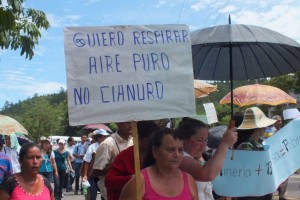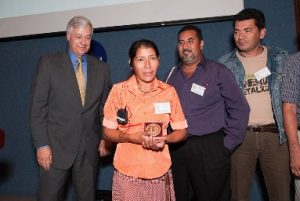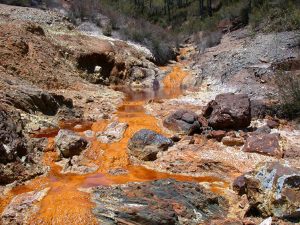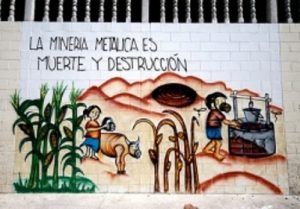Defending Natural Resources, Human Rights
Honduras News: More Violence in the Aguan & Protests against Mining Concessions
CounterPunch Magazine: Central America’s Newest “Death Squad Democracy”
September 14, 2012
by Andy Thayer, part of the September La Voz de los de Abajo delegation
My first day in Honduras last week was also my first in a truly “Third World” country, though from what I’ve seen, portions of Russia and the Appalachians could give it a run for the money. Of the nine people on our delegation, I’m easily the least traveled in this part of the world, having never gone farther south than New Orleans. Plus I’m monolingual.
That said, I’ve done my best to read up before getting here, have had ready access to good translations, plus a surprising number of the campesinos are bilingual. Last night I spoke with a man who was part of a land occupation near Progresso. He looked to be in his seventies and had been deported a few years ago. A few days earlier we spoke with a man who was part of a land occupation, who had badly burned his foot while working in Florida. He told us that his boss told him he couldn’t work anymore and then he was deported. One can’t escape the impression that migrant workers are disposable people to the U.S., to be employed when young and healthy, then dumped back on impoverished countries when they’re no longer useful.
Honduras is the third poorest country in the Western hemisphere. After Mexico, it is the largest source of migrants from Central America to the U.S. Due to the frequent attacks on migrants, a road from Tegucigalpa to the Olancho in the north has been dubbed the “Highway of death.” And then they have to traverse Guatemala and Mexico, where Central American migrants are particular marks for thieves, kidnappers and drug lords hoping to use them as mules, followed by the deadly desert crossing at the U.S. border. One of our delegation, Lois Martin, reported that thus far this year there have been close to 200 bodies found in the Tucson border patrol sector alone.
With all the death and violence facing them if they migrate north, one might wonder why people might choose to leave Honduras. The frequency that you see people here wearing clothing in the patriotic colors, blue and white, with little Honduran flags adorning them, rivals the displays at U.S. party conventions. In practically every conversation where the issue came up, people insisted that they don’t want to leave, but often had no choice.
The violence at home has truly gone off the charts since the 2009 U.S.-supported coup. As many have noted, Honduras is now the murder capital of the world — 86 per 100,000 people, a rate nearly five times Mexico’s.
Read full article at Counterpunch.org
Honduras: A Country Sold Off and Polluted by Mining
September 10, 2012
By Ollantay Itzamná, translated by Sister Cities
Under a burning sun, with tired faces reddened by the tropical heat, holding banners demanding social and environmental justice, several hundred protesters against irresponsible mining enter the almost indifferent city of Santa Barbara, Honduras, after a walk of several kilometers. No reporters or TV cameras meet them. The only press present are committed local and regional radio stations such as Radio Progreso of the Society of Jesus.
One of the protesters carries a banner that reads: “For me, for my children, for my country: mining no and no!” Don Daniel Martinez, a 53-year-old leader of Santa Barbara Environmental Movement (MAS), states, “this protest is in defense of water and against the 64 metallic mining concessions that the government approved for the Department of Santa Barbara.” .Santa Barbara measures 5.024 square kilometers and many of the main rivers of the country run through the department. Since the 1940s, several foreign companies have taken turns exploiting the El Mochito mine in the municipality of Las Vegas, Santa Barbara, and have ended up killing the country’s largest lake, Lake Yojoa with mercury and cyanide pollution. Today, the impoverished community members who live near the lake are organizing to try to restore it.
Don Daniel also states:, “The Quitaganas mining project in the municipality of Nispero, Santa Barbara, will completely destroy the Malapón Mountain and the Malapa River which supplies water to more than 6,000 local people.” Another protester says: “I’m from the city of Santa Barbara. I know these mining projects will eventually end up also expelling or killing those of us who live in this city. So I am here protesting these mining projects. Hopefully everyone will wake up in time, and we will fight together.”
According to the book Mining in Honduras, published in 2009 by the Association of NGOs of Honduras (ASONOG) since 1996 372 mining concessions have been granted in Honduras of which 315 were being used for exploration and 57 were being used for exploitation in 2009. Out of every 100 square kilometers of national territory, 31 square kilometers are for mining concessions. Most of these permits are for open-pit mining which uses cyanide and is highly lethal for the environment, people and culture. The ASONOG publication also notes that in the last five years, the mining companies earner 9.920 billion lempiras ($522 million) and only paid the government 618 million lempiras ($ 32 million) in taxes. That is, for every 100 lempiras the company earned, only 16 lempiras stayed in the country.
In the 1880s, Honduras received about 55% of the export earnings from the silver extracted from the mine El Mochito. But at the beginning of the 1990s, the sum total from mineral exports accounted for less than 2% of GDP, and less than 0.3% employment in Honduras (Oxfam, 2011:9). By 2009, according to reports from the Central Bank of Honduras, mining accounted for 0.75% of GDP. So, remittances from Honduran migrants living abroad are 30 times more than the income generated by mining companies. Why accept the irreversible cultural and socio-environmental costs of mining for such a paltry contribution to the national economy?
It’s outrageous that under Spanish rule, private mining companies paid the royal fifth, so that 20% of their income was paid as taxes to the Crown and today mining companies don’t even pay 3% of their earnings in taxes to the supposedly independent Government of Honduras, even now, during this “long spring” of high mineral prices in the international market.
In Honduras, the mining companies have the freedom and power to decide the where, when and how of their mining projects. Always watching out for their profitability, they have converted the National Congress in mere submissive brokers of mining concessions. There are regulations for Strategic Environmental Studies but these studies are funded and manipulated by the mining companies.
The arrogance of the private sector in Honduras reaches such a degree that members of Congress who are supposed to be explaining to the public the contents of the new proposed mining law, which was proposed by mining companies, are primarily sharing information about the law with mining company employees. According to MAS leader Don Daniel, in the department of Santa Barbara, for example, this public consultation process was conducted only with the miners at the El Mochito Mine, and officials refused to debate the law with community organizations.
The criminal behavior of mining companies, conducted in impunity and with the collusion of each successive government, generates hatred and disgust even in the most dormant consciences. From Argentina, up through Bolivia, Peru, Panama, Honduras and Mexico, the cry for water and repudiation of mining operations constitutes the backbone of the simultaneous and stealthy awakening of our continent, Abya Yala, which has been dug up and poisoned for centuries by those greedy for our mineral wealth. Two hundred years ago, the fight for “independence” were undertaken in the name of freedom but never finished. Apparently, now, in the 21st century, the repudiation of the crime of mining and the clamor for the human right to water has become a catalyst for continuing the popular movement for emancipation.
(Read the original version in Spanish)




